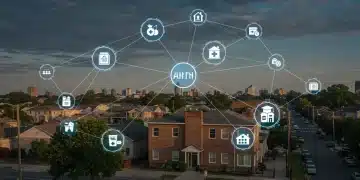Community Resource Directory 2025: Your Guide to Finding Support

A community resource directory for 2025 is a comprehensive, up-to-date listing of local organizations, services, and programs designed to support individuals and families in need, providing a centralized hub for essential assistance and information.
Navigating the landscape of available support can be challenging. That’s where a community resource directory: Finding the Right Support for Your Needs in 2025 becomes invaluable, acting as a comprehensive guide to connect individuals and families with vital local services.
Understanding the Evolving Landscape of Community Resources
Community resources are the backbone of a thriving society, offering essential support and services to individuals and families. As we look towards 2025, understanding how these resources are evolving is crucial for ensuring everyone has access to the assistance they need.
The Growing Importance of Digital Directories
Digital directories have become increasingly important in connecting people with community resources. They offer a centralized, easily accessible platform for finding information about various services, making it simpler for individuals to locate and access support.
Key Trends Shaping Community Resources in 2025
Several trends are shaping the future of community resources, including increased demand, evolving funding models, and a greater emphasis on collaboration and technology.

- Increased Demand: With economic uncertainty and social challenges, the demand for community resources is expected to continue growing.
- Evolving Funding Models: Traditional funding sources may be insufficient to meet the rising demand, leading to innovative funding models like crowdfunding and social impact bonds.
- Emphasis on Collaboration: Collaborative efforts between different organizations and agencies are becoming more common to streamline services and avoid duplication.
In conclusion, understanding these evolving trends is essential for navigating the community resource landscape in 2025. Digital directories, driven by technology and collaborative efforts, will play a vital role in connecting individuals with the support they need.
Navigating Your Local Community Resource Directory
Finding the right support starts with understanding how to effectively navigate your local community resource directory: Finding the Right Support for Your Needs in 2025. Whether you are accessing it online or through a local organization, knowing how to search and filter information is key.
Online Directories: A World of Information at Your Fingertips
Online directories offer a convenient way to access a wide range of community resources from your computer or mobile device. Many directories have user-friendly interfaces, making it easy to search and filter information.
Local Organizations: Your Trusted Community Guides
Local organizations such as community centers, social service agencies, and libraries often maintain their own directories or can provide guidance in navigating existing ones.
Navigating your local directory involves several steps:
- Start with a Clear Goal: Identify the specific type of support you are looking for, such as food assistance, housing, or mental health services.
- Use Keywords and Filters: Utilize the search function and filters to narrow down the results based on your needs.
- Review the Details: Carefully examine the information provided for each resource, including eligibility requirements, contact information, and hours of operation.
By mastering the art of navigating your local community resource directory, you can unlock a wealth of support and connect with the services you need. Local organizations and online directories are invaluable tools in this journey.
Types of Resources Typically Listed
A comprehensive community resource directory: Finding the Right Support for Your Needs in 2025 typically includes a wide range of services, catering to diverse needs within the community. Knowing what types of resources are available can help you find targeted assistance.
Essential Needs: Food Banks, Shelters, and Clothing Assistance
These resources address basic survival needs, providing food, shelter, and clothing to individuals and families facing hardship. They are often the first point of contact for those in crisis.
Healthcare Services: Clinics, Mental Health Support, and Substance Abuse Programs
Access to healthcare is crucial for overall well-being. Community resource directories often list clinics, mental health services, and substance abuse programs to ensure that everyone can receive the care they need.
Besides the above, a community resource directory may also include:
- Education and Employment: Resources for job training, literacy programs, and educational opportunities.
- Legal Aid: Free or low-cost legal services for those who cannot afford legal representation.
- Financial Assistance: Programs that provide financial assistance for rent, utilities, and other essential expenses.
By recognizing the types of resources typically listed, you can efficiently navigate community resource directories and find the support that aligns with your specific needs. These directories serve as a bridge to essential services that can improve lives.
Evaluating Resource Quality and Reliability
Ensuring the quality and reliability of resources listed in a community resource directory: Finding the Right Support for Your Needs in 2025 is essential to avoid misinformation and scams. It’s crucial to evaluate resources carefully before seeking assistance.
Checking for Accreditation and Licensing
Accreditation and licensing are indicators of quality and compliance with industry standards. Look for resources that have been accredited by reputable organizations or licensed by relevant government agencies.
Reading Reviews and Testimonials
Reviews and testimonials can provide valuable insights into the experiences of other users. Check online reviews and social media to gauge the reputation of the resource.

When evaluating resources, consider these measures:
- Verify Contact Information: Ensure that the contact information provided is accurate and up-to-date. Call the organization to confirm its existence and verify its services.
- Check for Transparency: Look for resources that provide clear information about their mission, services, and funding sources.
- Be Wary of Scams: Beware of resources that ask for upfront fees or personal information before providing assistance.
By diligently evaluating the quality and reliability of listed resources, you can confidently navigate community resource directories. Accreditation, reviews, and transparency are key indicators to consider when selecting services that meet your needs.
Leveraging Technology to Enhance Resource Access
Technology plays a pivotal role in enhancing access to community resource directory: Finding the Right Support for Your Needs in 2025, making it easier for individuals to find and connect with the support they need. Innovations like mobile apps and AI-powered search are revolutionizing the way resources are accessed.
Mobile Apps: Support in Your Pocket
Mobile apps provide convenient access to community resource directories from your smartphone or tablet. These apps often offer features such as GPS-based searches, push notifications, and offline access.
AI-Powered Search: Finding What You Need Faster
Artificial intelligence (AI) is being used to improve the search functionality of community resource directories. AI-powered search engines can understand complex queries and provide more relevant results.
With the help of modern technology, one can:
- Use Chatbots for Assistance: Chatbots can assist users in navigating directories, answering questions, and providing personalized recommendations.
- Access Telehealth Services: Telehealth platforms offer remote access to healthcare providers, expanding access to care for those in rural or underserved areas.
- Participate in Online Communities: Online communities and forums connect individuals with shared experiences, providing peer support and valuable information.
By leveraging technology, community resource directories are becoming more accessible, user-friendly, and efficient in connecting individuals with the support they need. Mobile apps, AI-powered search, telehealth, and online communities are transforming access to resources.
Future Trends in Community Resource Directories
Looking ahead, several trends are poised to shape the future of community resource directory: Finding the Right Support for Your Needs in 2025. These trends include enhanced personalization, data integration, and proactive outreach.
Enhanced Personalization: Tailoring Resources to Individual Needs
Personalization is about tailoring resources to meet the unique needs and preferences of each individual. This involves using data and algorithms to provide customized recommendations and support.
Data Integration: Connecting the Dots for Better Outcomes
Data integration involves connecting data from various sources to create a more holistic view of community needs. This enables organizations to better understand the challenges facing individuals and families.
The future also beholds:
- Proactive Outreach: Reaching out to individuals who may not be aware of available resources or who may be hesitant to seek help.
- Focus on Prevention: Shifting the focus from reactive interventions to proactive prevention strategies that address the root causes of social problems.
- Emphasis on Equity: Ensuring that all individuals, regardless of their background or circumstances, have equitable access to community resources.
By embracing these future trends, community resource directories can become even more effective in connecting individuals with the support they need to thrive. Enhanced personalization, expanded data integration, proactive outreach, and promotion of equity are some of the trends to look ahead.
| Key Point | Brief Description |
|---|---|
| 🔍 Navigating Directories | Effective search strategies and filtering techniques within community directories. |
| 🛡️ Evaluating Quality | Methods to ensure the reliability and accreditation of resources listed. |
| 📱 Tech Integration | Use of mobile apps and AI for enhanced accessibility. |
| 📈 Future Trends | Personalization and proactive outreach strategies to improve community welfare. |
Frequently Asked Questions
▼
A community resource directory is a comprehensive list of local organizations, services, and programs that provide support to individuals and families in need, covering areas like food, housing, healthcare, and education.
▼
You can find a local directory by checking with your local government, community centers, libraries, or searching online using keywords like “community resources near me” or “[your city] resource directory.”
▼
Technology enhances access through mobile apps, AI-powered search, telehealth services, and online communities, making it easier to find and connect with the support you need remotely.
▼
If you find outdated information, verify the details with the organization directly. Many directories also have a feedback mechanism to report inaccuracies and help keep the information current.
▼
Ensure reliability by checking for accreditation and licensing, reading reviews and testimonials, verifying contact information, assessing transparency, and being cautious of requests for upfront fees or personal information.
Conclusion
In conclusion, navigating a community resource directory: Finding the Right Support for Your Needs in 2025 effectively involves understanding its complexities, valuing resource quality, and utilizing technology. By staying informed and proactive, individuals can successfully connect with vital support systems to enhance their lives and contribute to a stronger community.





